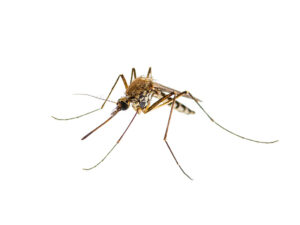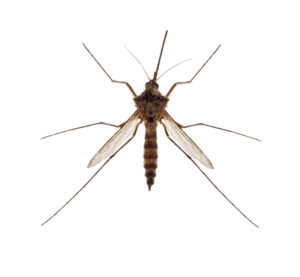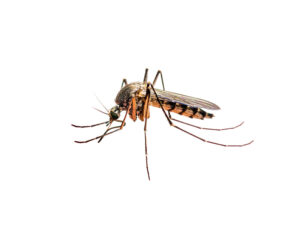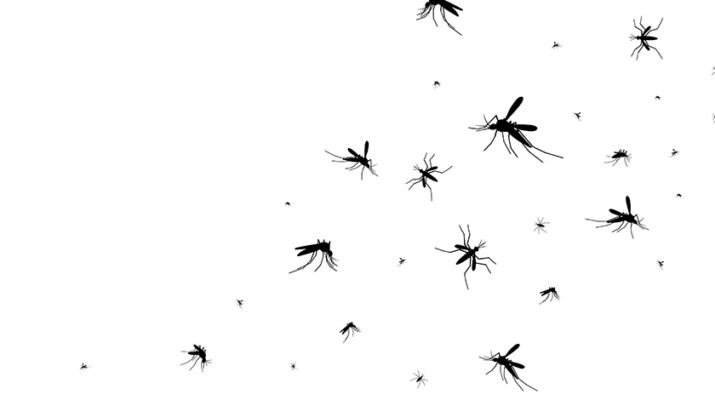By Barbara Pierce

One of the best things about winter in the Mohawk Valley is the absence of mosquitoes — none of those pesky little biting nuisances with their high-pitched whine. Swat one and 10 more will land on you, plumping up with your blood.
Yes, mosquitoes are a big nuisance for us during the summer. There are two good reasons to control them: to avoid their bites and to prevent the spread of diseases they carry.
Most of our mosquitoes don’t carry disease-causing viruses. Fortunately, only a few of the mosquito species in our area do carry diseases. Diseases like the West Nile virus which has been found in every county in New York state,zika virus which has been found in areas around New York City and eastern equine encephalitis virus, found mostly in the mosquitoes that live in the swampy areas of north central New York.
You may have noticed that mosquitoes don’t attack us all equally. Some people are ‘mosquito magnets’ while others get off bite-free. This has puzzled scientists for some time. Now research suggests that certain body odors are the deciding factor, as reported in the October 2022 issue of the journal Cell.
Each of us has a unique skin odor, a blend of different chemical compounds. Mosquitoes are especially attracted to people with higher levels of compounds called carboxylic acids on their skin. If you have high levels of this chemical on your skin, you’ll be the one getting all the bites.
To determine what we can do to reduce the mosquitoes around our homes, we contacted the departments of health at both Oneida County and Herkimer County to see what help they offer. Neither county offers any mosquito abatement measures; it’s up to each individual to hire a mosquito control professional.
 We asked customer service representative Katrina Miller of Mosquito Victory Mosquito and Tick Control serving Rome and Utica for tips on how to eliminate mosquitoes around our homes and property.
We asked customer service representative Katrina Miller of Mosquito Victory Mosquito and Tick Control serving Rome and Utica for tips on how to eliminate mosquitoes around our homes and property.
“First, remember that mosquitoes need water to breed,” she said. “It takes only a very small amount of water to attract a female mosquito to decide this is a place for her to lay her eggs. Even a soda cap of water can create thousands of mosquitoes.”
Mosquitoes can develop in any standing water that has been standing for more than four days.
To reduce the mosquito population around your home and property, reduce or eliminate all standing water and debris. Dispose of anything that holds water. Dispose of used tires, which are a significant mosquito-breeding site. Drill holes in the bottoms of recycling containers that you keep outdoors. Make sure roof gutters drain properly, and clean clogged gutters in the spring and fall. Turn over plastic wading pools and wheelbarrows when you’re not using them.
Remove leaf litter from yards and gardens.
“Mosquitoes love the undersides of things like leaves,” said Miller. “That’s their favorite place.”
Clean vegetation and debris from the edges of ponds. Clean and chlorinate swimming pools, outdoor saunas, hot tubs and other water features such as fountains, birdbaths and garden ponds. If your pool is small, drain it. If it’s large, cover it and drain water from the cover.
Even the shallow ruts carved into the grass by a lawnmower or heavy vehicle can become a breeding ground for mosquitoes.
 Heavily wooded areas have a lot of mosquitoes, as do areas with tall grasses.
Heavily wooded areas have a lot of mosquitoes, as do areas with tall grasses.
To keep your home mosquito-free, make sure all your windows and doors have screens and that the screens do not have rips, tears or holes.
Also, “The way you dress is important,” added Miller. “Mosquitoes aren’t attracted to light colored clothes as much. Cover your skin as much as possible. Stay inside at sunrise, sunset and early in the evening when some mosquito breeds are most active.”
“The best method for getting rid of mosquitoes is to let us treat them,” she said. “We’ll come out every 21 days, as this corresponds with the life cycle of the mosquito; we stay ahead of their breeding cycles. We’ll get you on a schedule and treat your yard regularly throughout mosquito season, which runs from mid-April to late September – early October. We’ll spray for mosquitoes, ticks and fleas with a pesticide that’s safe for pets and children. You should see an immediate reduction in the mosquito population within 24 hours of your first treatment.”
“People sometimes ask about just doing one treatment,” she added. “However, if you just do one treatment, there’s no guarantee that it will get rid of the problem because the protection degrades in time.”

